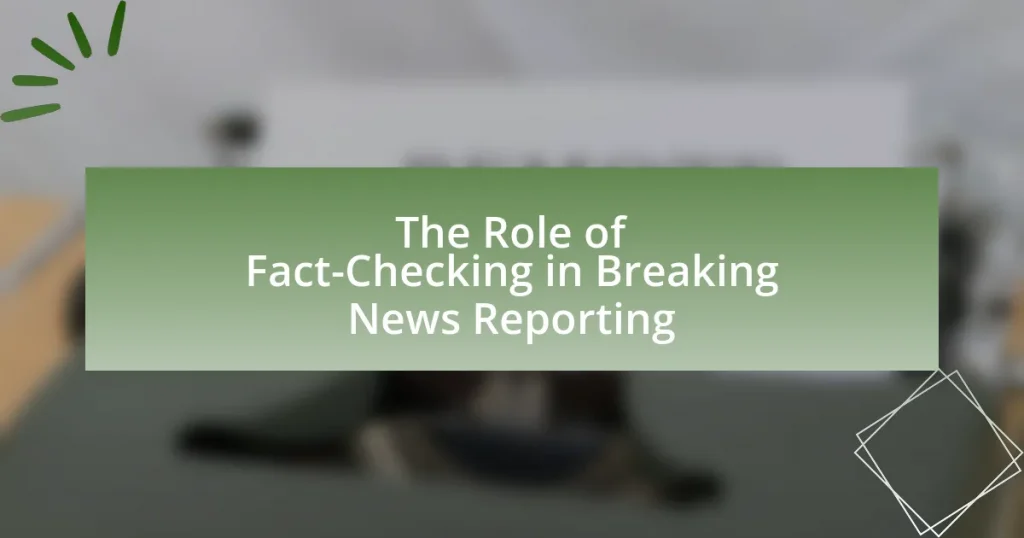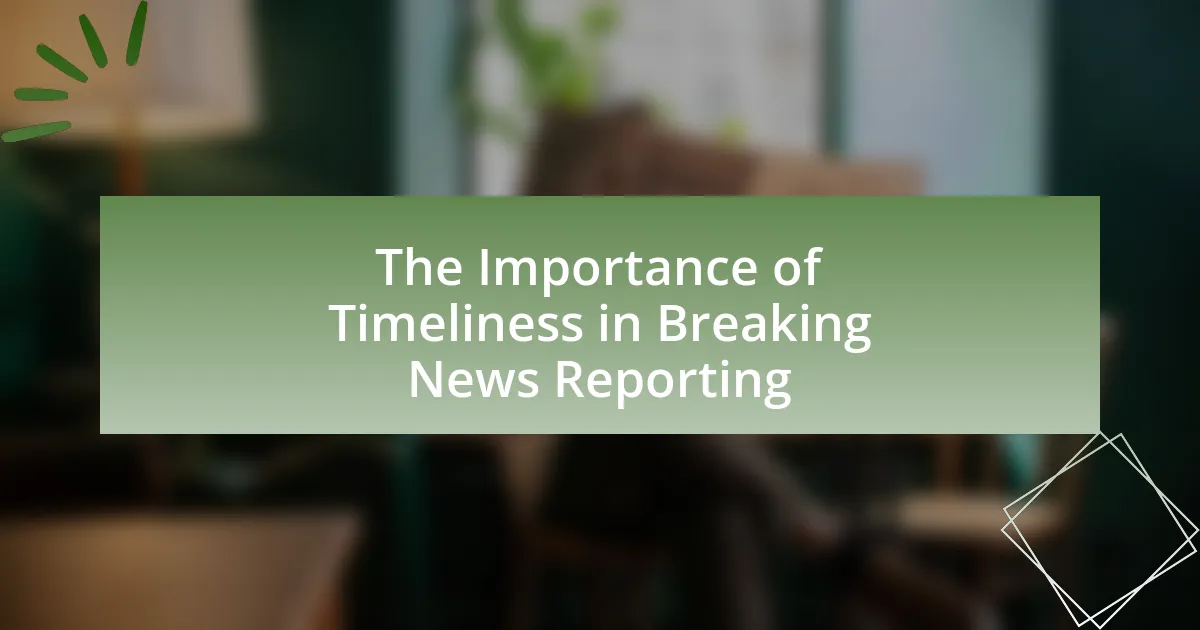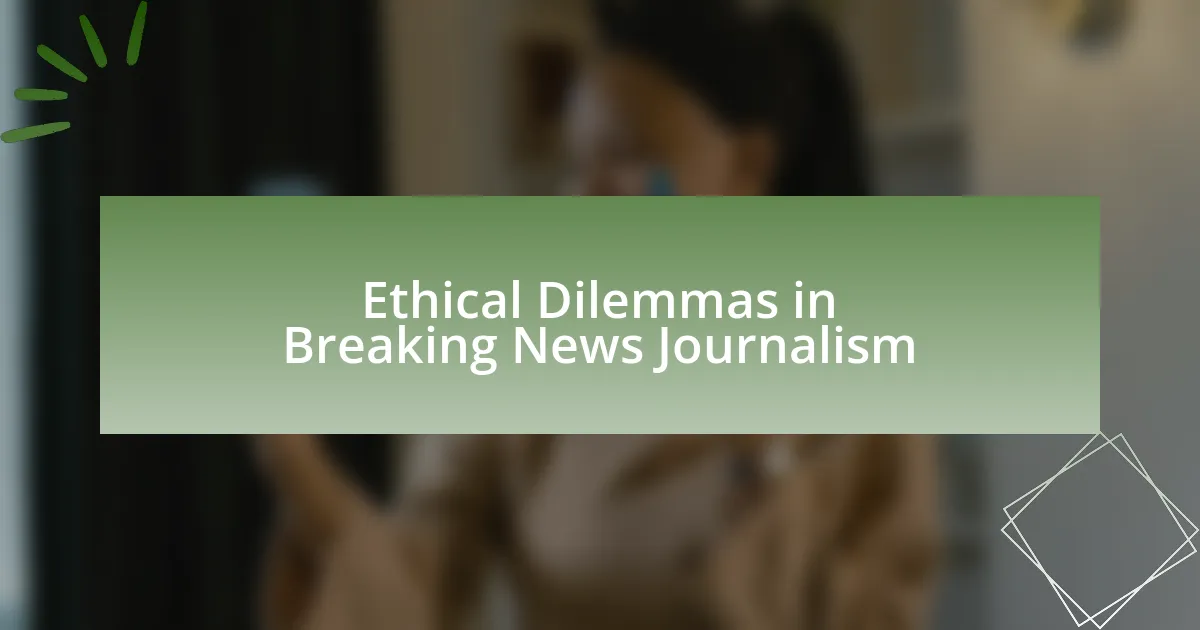The article focuses on the critical role of fact-checking in breaking news reporting, emphasizing its importance in ensuring the accuracy and reliability of information disseminated to the public. It outlines the essential processes involved in fact-checking, such as verifying sources and cross-referencing claims, and discusses the potential consequences of failing to fact-check, including the spread of misinformation and erosion of public trust in media. Additionally, the article highlights best practices for effective fact-checking, the challenges faced by fact-checkers in fast-paced news environments, and the impact of fact-checking on audience engagement and public perception of news.
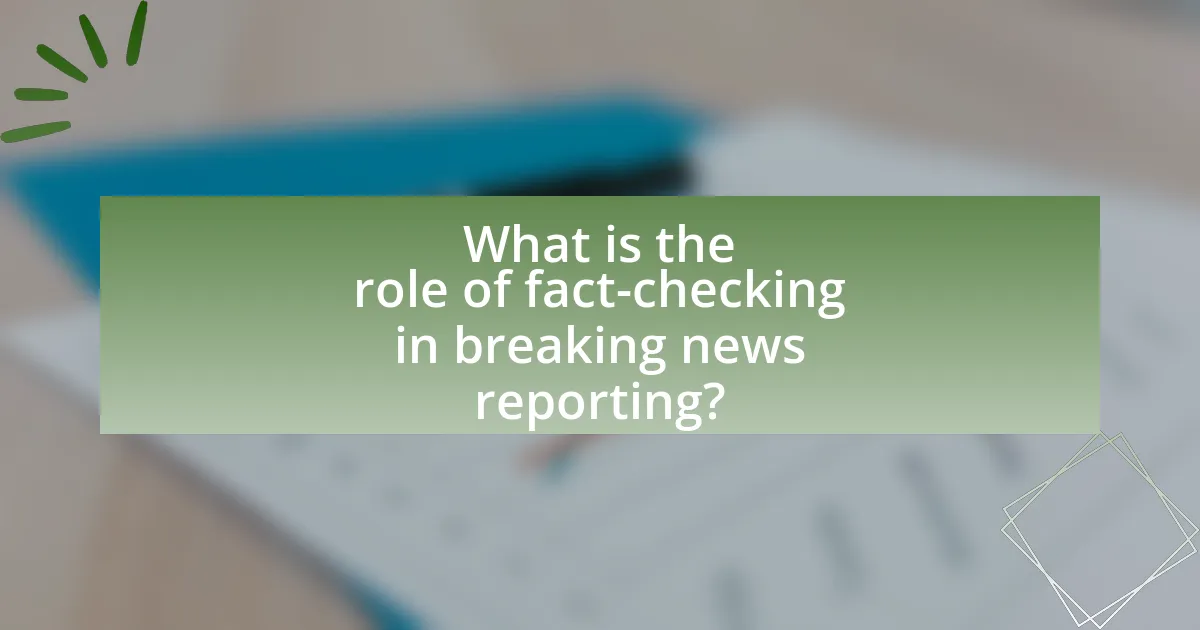
What is the role of fact-checking in breaking news reporting?
Fact-checking plays a crucial role in breaking news reporting by ensuring the accuracy and reliability of information disseminated to the public. In the fast-paced environment of breaking news, where information can spread rapidly, fact-checking serves to verify claims, identify misinformation, and uphold journalistic integrity. For instance, a study by the American Press Institute found that 60% of Americans believe that fact-checking improves the credibility of news organizations. This highlights the importance of fact-checking in maintaining public trust and providing accurate reporting during critical events.
Why is fact-checking essential in the context of breaking news?
Fact-checking is essential in the context of breaking news because it ensures the accuracy and reliability of information disseminated to the public. In fast-paced news environments, misinformation can spread rapidly, leading to public panic or misinformed decisions. For instance, during the COVID-19 pandemic, false claims about treatments circulated widely, which could have resulted in harmful consequences. By verifying facts before publication, news organizations uphold journalistic integrity and maintain public trust, as evidenced by studies showing that audiences are more likely to rely on sources that prioritize fact-checking.
What are the potential consequences of not fact-checking breaking news?
Not fact-checking breaking news can lead to the dissemination of false information, which can cause public panic, misinformation, and damage to reputations. For instance, during the Boston Marathon bombing in 2013, unverified reports led to widespread confusion and fear, highlighting how unchecked information can escalate a crisis. Additionally, inaccurate reporting can erode trust in media outlets, as seen in various instances where false narratives have resulted in public backlash against news organizations. This underscores the critical need for rigorous fact-checking to maintain credibility and ensure accurate communication during urgent situations.
How does fact-checking enhance the credibility of news organizations?
Fact-checking enhances the credibility of news organizations by ensuring the accuracy of information before publication. This process involves verifying claims, cross-referencing sources, and correcting misinformation, which builds trust with the audience. According to a study by the Pew Research Center, 62% of Americans believe that fact-checking improves the reliability of news sources. By consistently applying rigorous fact-checking standards, news organizations can demonstrate their commitment to journalistic integrity, thereby fostering a reputation for reliability and accountability in reporting.
What processes are involved in fact-checking breaking news?
Fact-checking breaking news involves several key processes: verification of sources, cross-referencing information, and assessing the credibility of claims. Journalists first identify and confirm the reliability of the sources providing the information, ensuring they are reputable and have firsthand knowledge. Next, they cross-reference the claims with multiple independent sources to corroborate the facts presented. Additionally, they evaluate the context and potential biases of the information to determine its accuracy. This systematic approach is essential for maintaining journalistic integrity and providing the public with reliable news, especially in fast-paced situations where misinformation can spread rapidly.
What are the key steps in the fact-checking process?
The key steps in the fact-checking process include identifying the claim, gathering evidence, verifying the information, and presenting the findings. First, fact-checkers pinpoint the specific claim that requires verification. Next, they collect relevant data and sources to assess the accuracy of the claim. Following this, they evaluate the credibility of the gathered information against established facts. Finally, the results are communicated clearly, often with a rating or summary of the claim’s truthfulness. This structured approach ensures that the fact-checking process is thorough and reliable, contributing to informed public discourse.
How do fact-checkers verify information from various sources?
Fact-checkers verify information from various sources by cross-referencing claims with credible evidence and authoritative sources. They utilize a systematic approach that includes identifying the original source of the information, assessing its credibility, and comparing it against established facts. For instance, fact-checkers often consult academic studies, official documents, and expert opinions to validate the accuracy of statements. This method is supported by organizations like the International Fact-Checking Network, which emphasizes transparency and accountability in the verification process, ensuring that the information is reliable and trustworthy.
What challenges do fact-checkers face in breaking news reporting?
Fact-checkers face significant challenges in breaking news reporting, primarily due to the rapid pace of information dissemination. The urgency to verify facts often conflicts with the limited time available for thorough investigation, leading to potential inaccuracies. Additionally, the prevalence of misinformation and disinformation, especially on social media platforms, complicates the fact-checking process, as false narratives can spread quickly before they can be addressed. Furthermore, the lack of access to reliable sources during breaking news events can hinder fact-checkers’ ability to confirm details, making it difficult to provide accurate information to the public. These challenges highlight the critical need for robust methodologies and resources in the fact-checking process to maintain credibility and trust in journalism.
How does the speed of news reporting impact fact-checking efforts?
The speed of news reporting significantly hampers fact-checking efforts by prioritizing rapid dissemination over accuracy. When news organizations rush to publish stories, they often lack the time needed to verify information thoroughly, leading to the spread of misinformation. For instance, a study by the American Press Institute found that 60% of journalists reported feeling pressured to publish quickly, which directly affects the quality of fact-checking. This urgency can result in errors that may not be corrected in a timely manner, further complicating the public’s ability to discern credible information.
What are common pitfalls in the fact-checking process?
Common pitfalls in the fact-checking process include reliance on unverified sources, confirmation bias, and inadequate context. Unverified sources can lead to the dissemination of false information, as fact-checkers may accept claims without proper validation. Confirmation bias occurs when fact-checkers favor information that supports their pre-existing beliefs, potentially skewing the accuracy of their findings. Inadequate context can result in misinterpretation of facts, as isolated data points may not accurately represent the broader situation. These pitfalls can undermine the integrity of the fact-checking process, leading to misinformation in breaking news reporting.
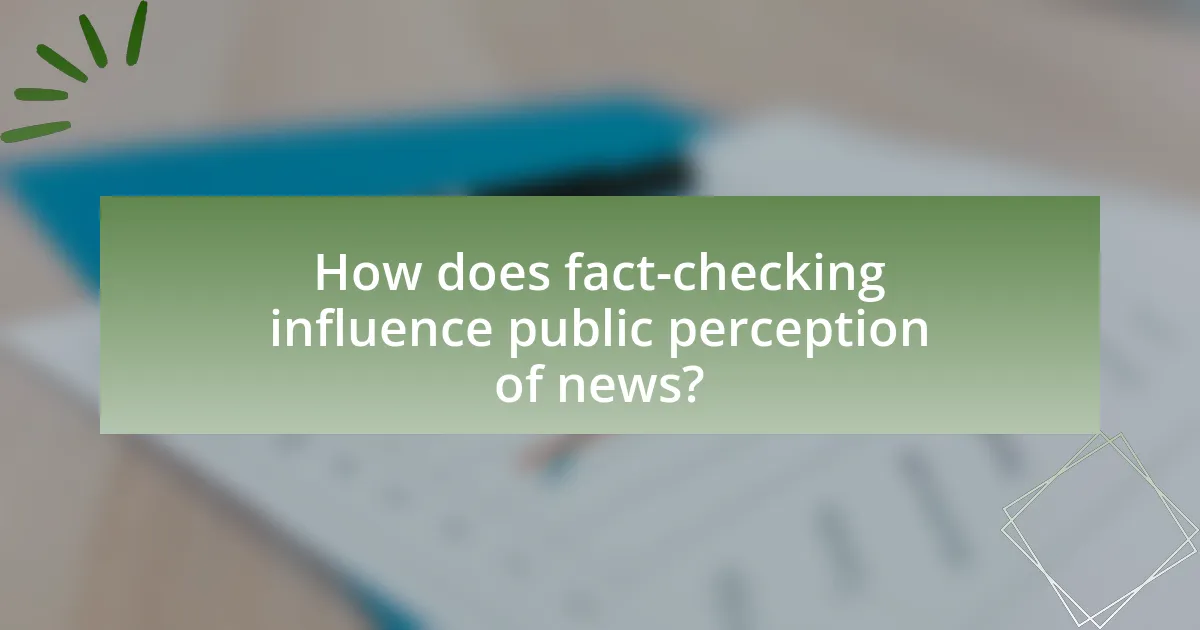
How does fact-checking influence public perception of news?
Fact-checking significantly enhances public perception of news by increasing trust and credibility in media sources. When news organizations engage in rigorous fact-checking, they provide verified information that helps to counter misinformation and disinformation. Research conducted by the Pew Research Center indicates that 62% of Americans believe that fact-checking improves the accuracy of news reporting, thereby fostering a more informed public. Furthermore, studies show that audiences exposed to fact-checked content are more likely to develop a positive view of the media outlet, as they perceive it as responsible and reliable. This relationship between fact-checking and public perception underscores the importance of transparency and accountability in journalism.
What role does fact-checking play in combating misinformation?
Fact-checking plays a crucial role in combating misinformation by verifying the accuracy of claims before they are disseminated to the public. This process helps to identify false information, thereby reducing its spread and influence. For instance, a study by the Pew Research Center found that fact-checking can significantly decrease the likelihood of individuals believing in false claims, as it provides them with credible evidence and context. By holding sources accountable and promoting transparency, fact-checking fosters a more informed public discourse, ultimately contributing to the integrity of news reporting.
How can fact-checking help restore trust in media?
Fact-checking can help restore trust in media by ensuring the accuracy of information presented to the public. When media outlets engage in rigorous fact-checking, they demonstrate a commitment to truthfulness, which can enhance their credibility among audiences. Research from the Pew Research Center indicates that 62% of Americans believe that fact-checking improves the quality of news, reinforcing the idea that transparency and accountability in reporting can lead to greater public trust. By consistently verifying claims and correcting misinformation, media organizations can rebuild their reputation and foster a more informed society.
What are the effects of misinformation on public opinion?
Misinformation significantly distorts public opinion by shaping perceptions and beliefs based on false or misleading information. Research indicates that exposure to misinformation can lead to the formation of incorrect beliefs, which persist even after the misinformation is debunked. For instance, a study published in the journal “Science” found that false information spreads faster and more widely than the truth, influencing public attitudes and behaviors, particularly in political contexts. This effect is compounded by confirmation bias, where individuals favor information that aligns with their pre-existing beliefs, further entrenching misconceptions.
How do audiences respond to fact-checked news?
Audiences generally respond positively to fact-checked news, as it enhances their trust in the information presented. Research indicates that when news is fact-checked, audiences are more likely to accept the information as credible, leading to increased engagement and sharing of the content. A study by the Pew Research Center found that 62% of Americans believe that fact-checking improves the accuracy of news reporting, reinforcing the idea that audiences value verified information. Furthermore, audiences tend to exhibit a greater willingness to discuss and act upon news that has undergone fact-checking, as it aligns with their desire for reliable and truthful reporting.
What is the impact of fact-checking on audience engagement?
Fact-checking significantly enhances audience engagement by increasing trust and credibility in news sources. When audiences perceive that information is verified and accurate, they are more likely to engage with the content, share it, and return for future updates. Research conducted by the Pew Research Center indicates that 64% of Americans believe that fact-checking improves the quality of news, leading to higher levels of interaction and discussion among viewers. This engagement is further supported by studies showing that fact-checked articles receive more shares on social media platforms, demonstrating a direct correlation between fact-checking and audience participation.
How does fact-checking affect the sharing of news on social media?
Fact-checking significantly reduces the sharing of false news on social media. Research indicates that when users encounter fact-checking labels or corrections, they are less likely to share misleading information. A study by Lewandowsky et al. (2012) found that exposure to fact-checking can decrease the likelihood of sharing false claims by up to 30%. This effect is particularly pronounced among users who are already skeptical of the information, as they tend to rely more on verified sources. Thus, fact-checking serves as a critical mechanism in promoting accurate news dissemination on social media platforms.
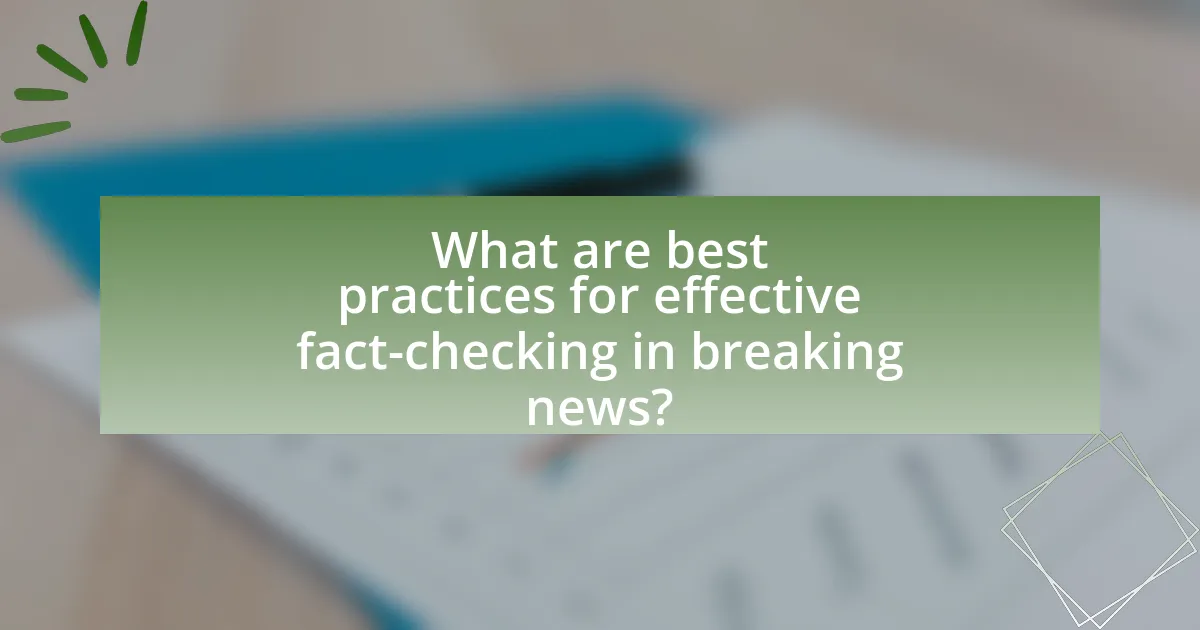
What are best practices for effective fact-checking in breaking news?
Best practices for effective fact-checking in breaking news include verifying information from multiple credible sources, prioritizing accuracy over speed, and clearly distinguishing between verified facts and unverified claims. Journalists should cross-reference data with reputable organizations, utilize official statements, and employ fact-checking tools to ensure reliability. For instance, the Poynter Institute emphasizes the importance of using established fact-checking websites like Snopes or FactCheck.org to corroborate information. Additionally, maintaining transparency with the audience about the fact-checking process enhances trust and credibility in reporting.
What tools and resources can enhance the fact-checking process?
Tools and resources that can enhance the fact-checking process include fact-checking websites, verification software, and databases. Fact-checking websites like Snopes and FactCheck.org provide reliable information and context for claims. Verification software such as InVID helps analyze and verify multimedia content, while databases like the Global Database of Fact-Checks offer a comprehensive repository of previously fact-checked claims. These resources improve accuracy and efficiency in the fact-checking process, ensuring that journalists can quickly verify information before publication.
How can technology aid in the verification of information?
Technology aids in the verification of information by utilizing advanced algorithms and data analytics to assess the credibility of sources and claims. For instance, machine learning models can analyze patterns in data to identify misinformation by cross-referencing facts against reputable databases. Additionally, tools like automated fact-checking services, such as ClaimBuster and FactCheck.org, provide real-time verification by scanning news articles and social media posts for accuracy. Research from the Pew Research Center indicates that 64% of Americans believe that technology can help reduce the spread of false information, highlighting its potential effectiveness in enhancing information reliability.
What are some reliable sources for fact-checking information?
Reliable sources for fact-checking information include Snopes, FactCheck.org, and PolitiFact. Snopes is widely recognized for debunking urban legends and misinformation, providing detailed analyses of claims. FactCheck.org, a project of the Annenberg Public Policy Center, focuses on political claims and provides evidence-based evaluations. PolitiFact, operated by the Poynter Institute, rates the accuracy of statements made by politicians and public figures, using a transparent methodology. These sources are trusted for their rigorous standards and commitment to factual accuracy, making them essential tools for verifying information in breaking news reporting.
What strategies can news organizations implement for better fact-checking?
News organizations can implement several strategies for better fact-checking, including establishing dedicated fact-checking teams, utilizing technology for verification, and fostering partnerships with independent fact-checking organizations. Dedicated teams ensure that fact-checking is prioritized and conducted by trained professionals, which enhances accuracy. Technology, such as AI tools, can assist in quickly verifying information against reliable databases, thereby increasing efficiency. Collaborating with independent fact-checkers, like the International Fact-Checking Network, provides additional credibility and resources, allowing news organizations to uphold high standards of accuracy in their reporting.
How can training improve the skills of fact-checkers?
Training can significantly improve the skills of fact-checkers by enhancing their analytical abilities and knowledge of verification techniques. Structured training programs provide fact-checkers with essential tools and methodologies, such as understanding source credibility, recognizing misinformation patterns, and utilizing fact-checking databases. Research indicates that trained fact-checkers demonstrate higher accuracy rates; for instance, a study by the International Fact-Checking Network found that organizations with formal training protocols achieved a 30% increase in verification accuracy compared to those without. This evidence underscores the importance of training in developing proficient fact-checking skills.
What role does collaboration play in effective fact-checking?
Collaboration is essential for effective fact-checking as it enhances the accuracy and reliability of information. When multiple fact-checkers work together, they can pool their expertise, share resources, and cross-verify claims, which significantly reduces the likelihood of errors. For instance, organizations like PolitiFact and FactCheck.org often collaborate with journalists and researchers to ensure comprehensive verification of facts, leading to more trustworthy reporting. This collaborative approach not only improves the quality of fact-checking but also fosters transparency and accountability in the media, as seen in initiatives like the International Fact-Checking Network, which promotes best practices among fact-checkers globally.
What are practical tips for journalists to ensure accurate reporting?
Journalists can ensure accurate reporting by implementing rigorous fact-checking processes. This involves verifying information from multiple credible sources before publication, which helps to eliminate errors and misinformation. For instance, a study by the American Press Institute found that 80% of journalists believe fact-checking improves the credibility of their reporting. Additionally, journalists should maintain transparency by disclosing their sources when possible, which fosters trust with the audience. Utilizing established fact-checking organizations, such as PolitiFact or Snopes, can also enhance the accuracy of reported information. By adhering to these practices, journalists can significantly improve the reliability of their news coverage.
